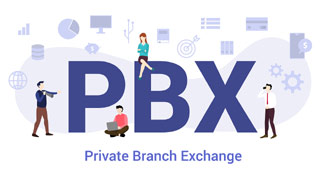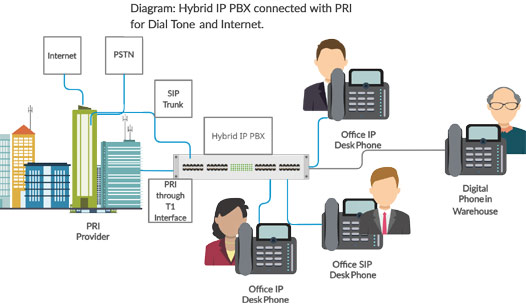The Preferred Phone System for many companies is an on-premise PBX
An
on-premise PBX routinely turns out to be the best choice for many
businesses. An on-premise PBX is where the phone system server
physically resides inside the establishment's property.
Companies looking to replace an older phone
system routinely maintain in place the appropriate infrastructure. This
includes their existing dial tone, usually in the form of a number of
business phone lines (PSTN) or a T1/PRI (ISDN) from a local Telco.
Furthermore, some established businesses frequently retain a portion
of
older telephone wiring for phones where the expense to
upgrade cabling would be costly. Most often, these phones
reside in locations such as warehouse space where phone use
is low. Companies that fall into this category regularly
determine an on-site
hybrid PBX is the best solution.
An on-premise PBX is where the phone system server
physically resides inside the establishment's property.
Companies looking to replace an older phone
system routinely maintain in place the appropriate infrastructure. This
includes their existing dial tone, usually in the form of a number of
business phone lines (PSTN) or a T1/PRI (ISDN) from a local Telco.
Furthermore, some established businesses frequently retain a portion
of
older telephone wiring for phones where the expense to
upgrade cabling would be costly. Most often, these phones
reside in locations such as warehouse space where phone use
is low. Companies that fall into this category regularly
determine an on-site
hybrid PBX is the best solution.
An on-premise PBX has a Lower Cost Over Time
Most VoIP providers offer plans that require a standard monthly fee for each phone. In the case of a company with 150 phones, the ongoing monthly expense can quickly get excessive. At $25.00/phone per month, the provider's service would be $3,750.00 for 150 phones, not including the cost for Internet.
"Premise" means idea, "premises" means location, "on-premise" means on location, "off-premise" means outside of location. The term "on-premise" has indeed been used in writing, signage, marketing materials, and technical documentation for decades, despite it being grammatically incorrect.
Alternatively, a company that uses a PRI at
$500.00/mo., which frequently includes twenty phone numbers
(DIDs) with a number of included minutes and Internet, dramatically
reduces expenses.
On-premise PBX phone systems can be easily financed.
Using $3,250.00 as a monthly payment could pay off the entire on
premise project in roughly two years. Once the financing is paid off, monthly
business expenses drastically decrease. Additionally, favored tax treatment often provides
for an accelerated total tax deduction in the first year.

Add SIP Trunks for additional Savings
For companies that produce a considerable amount of calls, especially International, an on-prem IP-PBX can handle a few SIP trunks to take advantage of low cost calling. SIP trunks are affordable and easy to configure on most IP-PBX systems.
Advantages of Experience. Telecom professionals regularly assess a potential customer's requirements and budget to determine the best phone system. They recognize types of businesses and are skilled in establishing the preferred solution.
Using a PRI
(Primary Rate Interface) you can dynamically send up to 23 separate
communications channels for voice, video or data. When a channel is
not being used for voice, it transfers data, increasing
Internet bandwidth. PRIs have been extremely popular
with medium
to large companies, and telecom providers have designed exceptionally
economical packages for business customers. The diagram shows a hybrid IP PBX that connects
both IP and digital phones to the dial tone provider through a PRI.
All signaling goes from the phone to the PBX, staying inside the
premises, which eliminates issues that can occasionally arise
with cloud-based phone systems.
When Bob in the warehouse dials an office phone, the call
is switched inside the company's network.
Calls to and from the PSTN go in and out through the PRI. Each phone
can be assigned its own DID (Direct Inward Dialing) phone
number. That allows outside calls to go directly to an employee's phone
if desired.
More Control with an on-premise PBX
 A
significant advantage for placing the PBX server in your facility is
that you maintain absolute control over how features are configured and the network. It allows for
more customization, including the ability to determine in-house the
required level of security. The loss of Internet won't
necessarily take down making and receiving phone calls. You can keep
your phone calls separate from your Internet traffic. One drawback
of VoIP calls is that congested Internet traffic has an effect on
voice traffic. An on-prem PBX incorporates signaling inside your
own network and offers crystal-clear voice.
A
significant advantage for placing the PBX server in your facility is
that you maintain absolute control over how features are configured and the network. It allows for
more customization, including the ability to determine in-house the
required level of security. The loss of Internet won't
necessarily take down making and receiving phone calls. You can keep
your phone calls separate from your Internet traffic. One drawback
of VoIP calls is that congested Internet traffic has an effect on
voice traffic. An on-prem PBX incorporates signaling inside your
own network and offers crystal-clear voice.
There are many excellent PBX systems.
Discovering which PBX represents the appropriate solution for your company frequently depends on a number of factors. Here are some of our top PBX choices: Best on-premise PBX Systems